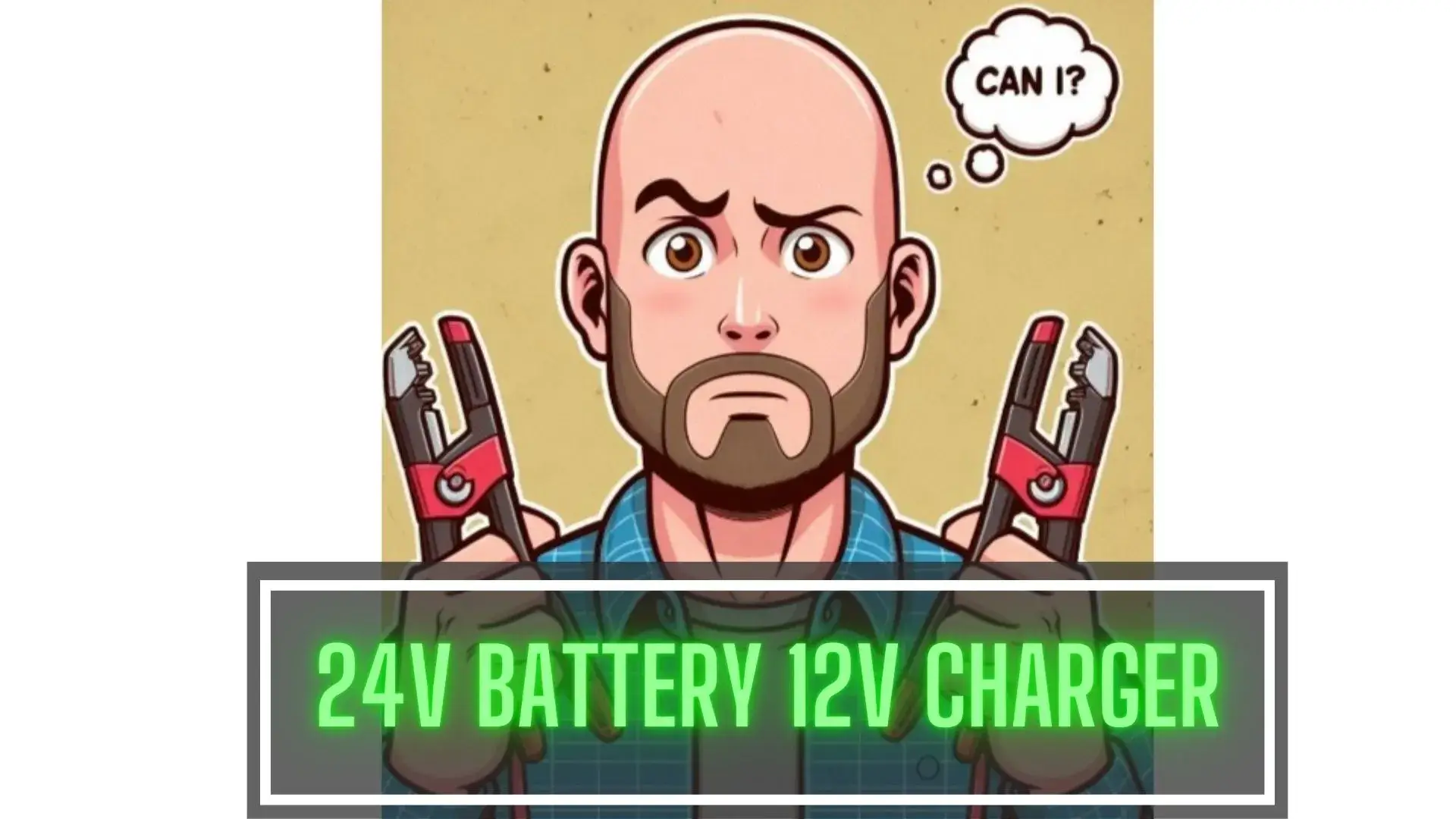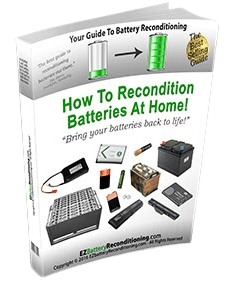If you have ever wondered, “Can You Charge a 24 Volt Battery with a 12 Volt Charger?”, this post is for you. We will explain how this works and what you need to be careful of.
If you have a 24-volt battery, you know how important it is to keep it charged and ready to use. You want to make sure your battery lasts long and performs well.
But what if you don’t have a 24-volt charger? Can You Charge a 24-volt battery with a 12-volt charger? The answer is yes, you can. But you probably shouldn’t.
There are a number of reasons why charging a 24-volt battery with a 12-volt charger is a bad idea. It can reduce your battery’s lifespan, lower its capacity, and even cause a short circuit or a fire. But how does that happen? And are there any situations where you can use a 12-volt charger safely?
In this article, I will explain the difference between 24-volt and 12-volt batteries, discuss the problems of using the wrong charger, and share the best practices for charging your 24-volt battery. Don’t miss this valuable information.
Let’s go!
| Step | Description |
|---|---|
| 1 | Disconnect the two 12-volt batteries from each other. |
| 2 | Connect the positive terminal of the charger to the positive terminal of the first battery and the negative terminal of the charger to the negative terminal of the first battery. |
| 3 | Turn on the charger and let it charge the first battery until it’s full. |
| 4 | Keep an eye on the charging process to prevent overcharging, which can damage the battery. |
| 5 | As soon as the first battery is fully charged, disconnect the charger. |
| 6 | Repeat steps 2-5 with the second battery. |
Table of Contents
Key Takeaways
- Charging a 24-volt battery with a 12-volt charger is not effective and can cause damage.
- It’s best to use a compatible 24-volt charger for a proper charge
- A variety of 24-volt battery chargers are available for multiple applications and devices
Can You Charge a 24-volt Battery with a 12-volt Charger
When it comes to charging a 24-volt lead acid battery system, which is typically made up of two 12-volt batteries, there are a couple of ways we can go. Each method has its own advantages and considerations, and the best one for you will depend on your specific circumstances.
It can seem confusing but don’t worry, I’ve got your back.
Charging Both 12 Volt Batteries Individually
If you only have a 12-volt charger, you can still charge your 24-volt battery system by charging each 12-volt battery individually. Here’s how:
- Disconnect the Batteries: Disconnect the two 12-volt batteries from each other.
- Connect the Charger to the First Battery: Connect the positive terminal of the charger to the positive terminal of the first battery and the negative terminal of the charger to the negative terminal of the first battery.
- Start Charging the First Battery: Turn on the charger and let it charge the first battery until it’s full.
- Monitor the Charging Process: Keep an eye on the charging process to prevent overcharging, which can damage the battery.
- Disconnect the Charger from the First Battery: As soon as the first battery is fully charged, disconnect the charger.
- Repeat the Process with the Second Battery: Repeat steps 2-5 with the second battery.
Risks of Charging 24-Volt Batteries with a 12-Volt Charger
So this seems like the ideal solution, right? I mean, why waste money on a 24-volt charger when you can do this instead?
Well, hold your horses. It’s not all rainbows and fairies.
Charging a 24-volt battery system with a 12-volt charger can pose a number of risks. These risks can vary depending on whether you charge both batteries individually or try to charge them at once.
Risks of Charging Both 12V Batteries Individually
If you’re using a 12-volt charger to charge each 12-volt battery individually, you could face the following problems:
- Uneven Charging: Charging the batteries individually could lead to an imbalance in the state of charge among the batteries in the 24-volt bank. This imbalance could potentially cause some batteries to be overcharged while others might be undercharged. This can cause lasting damage to each battery and shorten their lives.
- Increased Time and Effort: Charging each battery individually with a 12-volt charger can be time-consuming. It requires more effort than charging them together with a 24-volt charger, and none of us need that.
Risks of Charging Both 12V Batteries at Once
If you attempt to use a 12-volt charger to charge both 12-volt batteries at once, you could face the following risks:
- Incomplete Charging: A 12-volt charger may not be able to fully charge a 24-volt battery, which can lead to undercharging.
- Potential Damage: Using a 12-volt charger for a 24-volt battery could potentially damage the battery over time.
- Fire Risk: Overheating is possible because of the increased load on the charger, which is double what it is designed for. Around batteries that may emit gasses, this could be dangerous.
- Inappropriate Charging Profile: Lithium-ion and LiFePO4 batteries have specific charging profiles that a 12-volt charger might not be able to provide.
Why You Should Invest in a 24-Volt Charger
I can’t stress strongly enough that rather than clowning around trying to charge your 24-volt batteries with your 12V charger, you should invest in a 24V.
Here’s why:
- Efficient Charging: A 24-volt charger can charge a 24-volt battery system more efficiently than a 12-volt charger.
- Reduced Risk of Damage: Using a charger that’s designed for your battery’s voltage can reduce the risk of damaging the battery.
- Appropriate Charging Profile: A 24-volt charger can provide the appropriate charging profile for your 24-volt battery, especially if it’s a lithium-ion or LiFePO4 battery.
- Convenience: Using a 24-volt charger is more convenient than having to charge each 12-volt battery individually with a 12-volt charger.
Charging Both 12V Batteries at Once Properly – with a 24V charger
If you have a 24-volt charger, you can charge both 12-volt batteries at the same time. Here’s how:
- Connect the Batteries in Series: Connect the positive terminal of the first battery to the negative terminal of the second battery. If your batteries are in situ, for instance, in an engine, they are already wired in series.
- Connect the Charger: Connect the charger’s positive terminal to the second battery’s positive terminal. Connect the charger’s negative terminal to the negative terminal of the first battery.
- Start Charging: Turn on the charger and let it charge the batteries until they’re full.
- Monitor the Charging Process: Keep an eye on the charging process to prevent overcharging, which can damage the battery.
- Disconnect the Charger: As soon as the battery is fully charged, disconnect the charger.
Maintaining a 24-volt Battery
So, we’ve sorted our charging issues, but how do we keep our battery in decent condition? How do we look after it?
Well, it’s easy peasy. Here’s how:
- Inspect regularly: Conduct visual inspections of your battery and charger for any signs of damage or wear.
- Clean connections: Keep the connections between your charger and battery clean. Dirty connections can reduce charging efficiency.
- Follow manufacturer guidelines: Follow your battery manufacturer’s recommendations for charging and maintenance.
- Use appropriate chargers: Always use chargers designed for 24-volt batteries. For example, use a 24-volt charger or a PV solar panel with a converter.
Popular Chargers for a 24-Volt Battery Chargers
When it comes to charging a 24-volt battery, using a 12-volt charger is not the right option. Instead, you’ll want a charger specifically designed for 24-volt batteries. I’ve gathered a list of popular 24-volt battery chargers that do a good job.
- NOCO Genius G7200 24V Battery Charger
The NOCO Genius G7200 is a versatile charger. It is designed for a number of battery types, including 24-volt lead-acid and lithium-ion batteries. Fast charging and advanced diagnostics to prevent overcharging.
- Black+Decker BC2WBD 24V Waterproof Charger
For those in need of a weatherproof solution, the Black+Decker BC2WBD is a reliable choice. It protects against moisture and dust. This is perfect for outdoor or marine applications.
- Schumacher SC1359 24V Fully Automatic Charger
The Schumacher SC1359 is a charger with an LED indicator that shows the charging status. Its microprocessor-controlled technology ensures precision and safety while charging 24-volt batteries.
- TecMate OptiMATE 7 24V Battery Charger
The TecMate OptiMATE 7 is an eco-friendly option. It is a smart charger with energy-saving technology. This charger adjusts the output based on the battery’s needs. It saves energy while maintaining optimal performance.
- SUNER POWER 24V Solar Panel Charger
The SUNER POWER 24V Solar Panel Charger harnesses the power of the sun. It’s a good choice for those seeking a renewable energy solution. This solar charger is compatible with various 24-volt battery types. It is perfect for off-grid setups.
- CTEK Multi US 25000 24V High Capacity Charger
The CTEK Multi US 25000 is designed for larger battery systems. It is meant for boats and recreational vehicles. It has a high capacity. It can efficiently and safely charge 24-volt batteries. It also provides multiple charging modes.
Check out this video on How to troubleshoot a 24 volt Battery Charger:
Before You Go…
You might think that charging a 48-volt battery with a 12-volt charger is a simple and harmless solution. But you would be wrong. In fact, it is one of the worst things you can do to your battery and your charger. It can cause irreversible damage, waste your time and money, and even put your safety at risk.
If you want to know the exact reasons why you should never do this and what you should do instead, read my next article. It’s titled “Can You Charge a 48-volt Battery with a 12-volt Charger? The Surprising Reason Why This is a Bad Idea”. Trust me, you don’t want to miss this.
Frequently Asked Questions
Here’s the FAQs
Can you charge a 24V battery with a 12V charger?
No, you cannot charge a 24V battery with a 12V charger. Doing so can damage your battery and charger. It’s essential to use the correct charger for your battery.
What charger do I need for a 24V battery?
You need a 24V battery charger to charge a 24V battery properly. These chargers are designed specifically for the battery’s voltage and capacity. Using the correct charger ensures that your battery will be charged efficiently.
What voltage charger is suitable for a 24V battery?
A suitable voltage charger for a 24V battery is a charger rated at 24 volts. This will provide the correct current and voltage to charge the battery properly.
Can you charge a 24V battery with a 12V car battery charger?
Yes, you can charge a 24V battery with a 12V car battery charger if you charge each 12-volt battery individually. Attempting to do so together may damage both the charger and the battery.
How long does it take to charge a 24V battery?
The time it takes to charge a 24V battery depends on the capacity of the battery and the charger’s output. Typically, larger batteries will take longer to charge than smaller ones. So, the exact time will vary. Check your battery’s specifications. Check your charger’s output. Use them to determine the approximate charging time.


